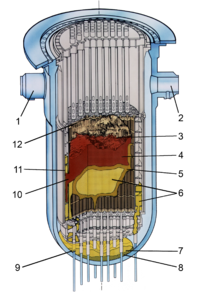
Photo from wikipedia
The influence of fuel level on Russian vanadiferous titanomagnetite sinter properties, productivity, and mineralogy are researched by sintering pot testing, metallographic microscopy, scanning electron microscopy analysis, and energy dispersive spectrometer… Click to show full abstract
The influence of fuel level on Russian vanadiferous titanomagnetite sinter properties, productivity, and mineralogy are researched by sintering pot testing, metallographic microscopy, scanning electron microscopy analysis, and energy dispersive spectrometer (SEM-EDS) analysis. A comprehensive index is evaluated in conjunction with the same indexes and significance coefficient as that in the Panzhihua Iron and Steel Group. Results show that with the increasing fuel level from 3.5% to 6.0%, flame front speed, yield, tumbling test index (TI), and productivity, all first increase and then decrease. The low temperature reduction degradation index (RDI+3.15) and softening zone (ΔT) gradually increase while the RI and starting temperature of softening (T10), and ending temperature of softening (T40) decrease with increasing fuel levels from 3.5% to 6.0%. With the increase of fuel level from 3.5% to 6.0%, the content of FeO, SiO2, and MgO increase, while TiO2 shows a decrease. For the same increase in fuel level, the number of pores and calcium ferrite and hematite decrease but the silicate increases. In addition, in the fuel level range of 3.5% to 5.5%, magnetite correspondingly increases but then shows a drop after 5.5%. Moreover, when the fuel level increases to greater than 5.0%, FeOx and fayalite quickly increase and a small amount of metallic iron appears under the fuel level of 6.0%. Overall, the optimal fuel level under current production conditions and indicator selection is 4.0%.
Journal Title: Materials
Year Published: 2021
Link to full text (if available)
Share on Social Media: Sign Up to like & get
recommendations!